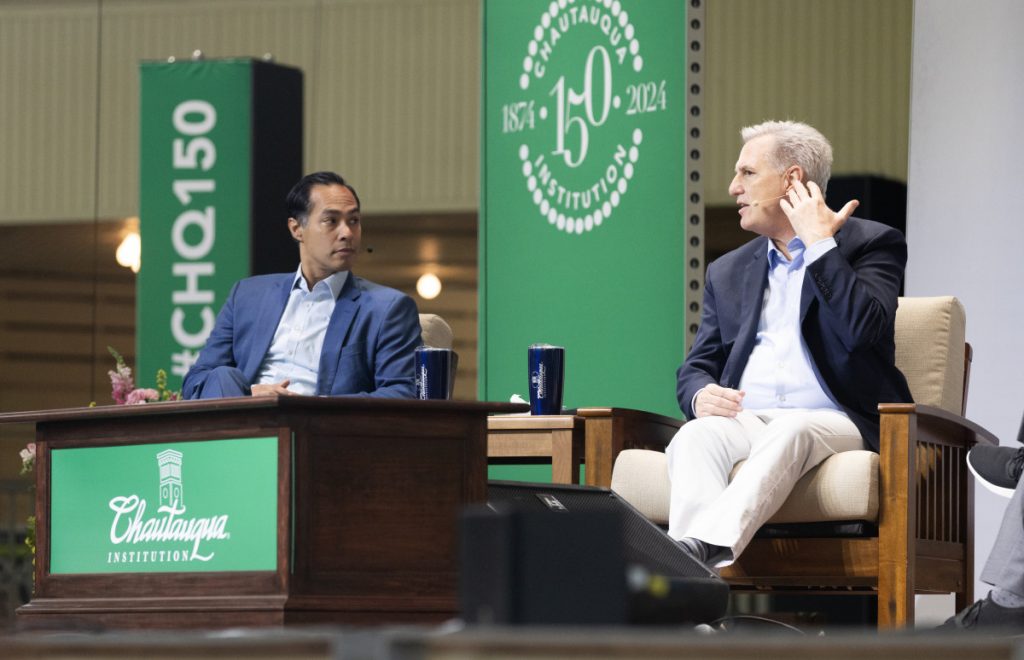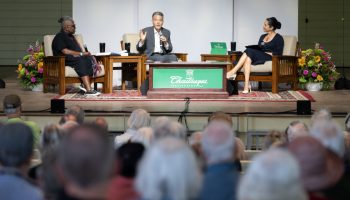
Julián Castro, the 16th U.S. Secretary of Housing and Urban Development, and Kevin McCarthy, the 55th Speaker of the U.S. House of Representatives, close the Week Four Chautauqua Lecture Series in conversation with President Michael E. Hill Friday in the Amphitheater.
What does the attempt to assassinate former President Donald Trump say about the state of American politics? Is Joe Biden fit to remain in the race for the presidency? Is there a path to unity in the United States? How can the broken American political system be fixed?
These are some of the questions former Speaker of the House Kevin McCarthy and former U.S. Secretary of Housing and Urban Development Julian Castro considered Friday morning in the Amphitheater for the final presentation in Week Four’s Chautauqua Lecture Series theme “Eight Billion and Counting: The Future of Humankind in a Crowded World.”
The conversation between Castro and McCarthy, moderated by Chautauqua Institution President Michael E. Hill, began with a reflection on political violence, especially in the wake of the assassination attempt on Trump at a campaign rally last Saturday in Butler, Pennsylvania. McCarthy noted that this new political moment was one that many Americans hoped would never occur.
“America has a time and place to be watching,” he said — the 1960s, which saw the assassinations of Martin Luther King Jr., President John F. Kennedy, and his brother Robert F. Kennedy. “We thought we would never relive that again. When we look at (the assassination attempt) … everyone will tell you, I think, ‘There is no explanation of why President Trump is not dead.’ ”
McCarthy, who represented California’s 20th congressional district in the House of Representatives for over 16 years, warned of the dangers presented by partisan media echo chambers, wherein Americans consume media that only emphasizes and reinforces their own beliefs, allowing them to become more and more entrenched in their preconceived thoughts and ideas. He said that, as long as Americans continued to drift further away from each other and deeper into polarization, more acts of political violence may be on the horizon; in his eyes, finding a way to compromise across different beliefs is of the utmost importance.
“In today’s world, it is not that we want compromise — we want to win and we want the other side to be destroyed,” McCarthy said. “I hope in these moments in time we all take a deep breath and say, ‘You know what, it has gone too far, and I want to keep my beliefs — but I want to respect the other person’s beliefs, as well.’ ”
Castro concurred with much of what McCarthy had to say, noting the importance of combating the divisive, often-inflammatory rhetoric that he said permeates large parts of contemporary political discourse.
The former HUD secretary and Democratic presidential candidate also lamented the shortening of Americans’ “collective attention span,” which leads to a lack of nationwide reflection after events such as the attempt on Trump’s life. Castro said he hoped the act of violence could begin pushing the United States toward a new political culture.
“My hope … coming out of this is that it is going to be a cautionary tale to prevent other types of incidents,” he said. “My hope is that that is going to be the learning that happens that prevents that kind of violence from taking place in the future.”
Perhaps the biggest reason the news cycle moved on so quickly from the assassination attempt is the ever-growing concern over Biden’s fitness to continue running for reelection.
Castro, who has previously raised concerns about Biden’s ability to defeat Trump in the November election, said he believed Biden would withdraw from the race. He said Biden has been an “enormously successful president,” but also noted that he “is not the same candidate in 2024 (as) he was in 2020.”
Castro explained that, for many Democrats, a second Trump presidency would have disastrous effects on both the United States and democracy; the most important thing, in the eyes of the party, is defeating Trump. To do that, many Democrats have argued that they must put forward the strongest candidate possible — many now believe that is not Biden.
“With the stakes so high, if the standard we are using is, ‘Are you the best candidate? Are you the best option to beat Donald Trump in November?,’ I think the answer to that is no,” Castro said. “So I believe, standing here today — or sitting here today — that, probably, President Biden will step aside.”
McCarthy raised concerns — also shared by many Democrats — that allowing delegates at August’s Democratic National Convention to decide who the party’s nominee for president is, without any input from voters, would “(go) directly against democracy.”
He said he still thinks it is unlikely that Biden withdraws from the race, though he also noted that the president has seemingly become more receptive to the idea over the past few days. If Biden were to step aside, McCarthy said, it would likely happen within the next week.
“He believes he is the only person that could beat Trump,” McCarthy added. “And he is the only person who has beaten Trump.”
In the wake of the assassination attempt, both Trump and Biden have emphasized a need for more national unity.
McCarthy said it is important to remember that both Trump and Biden are also actively campaigning for the presidency, so many of their differences are going to inevitably be highlighted. He did think, though, that Trump’s Thursday night address at the Republican National Convention showed that he was making somewhat of an effort to be conscious of his rhetoric, and McCarthy stressed the importance of both candidates continuing to do so as the election heats up.
“As we get closer, people’s temperature will rise again,” he said. “Just watch the tone.”
Castro reflected on his own experience campaigning for president in 2020, recalling a thirst for more unity from many Americans. He said that, regardless of partisan leaning or ideological differences, every person he spoke to on the campaign trail was eager for two things: unity and solutions.
“That gave me hope, because I think that a lot of this starts with the people,” Castro said. “I think, as somebody that is out of politics now, … it is incumbent on all of us to create the incentives for people who are trying to unify.”
Castro said many Americans don’t feel inclined to vote because of how divided politics has become, and both sides of the aisle must work to change that. One of the first steps he proposed is to introduce nationwide independent redistricting commissions.
Currently, each state determines its own system for redrawing its congressional districts every 10 years. In 2020, only four states utilized an independent commission. In the other 46 states, districts were redrawn by the majority party in the state legislature, state courts or by a political commission. In cases where the political party with the majority in the state legislature is able to pass their own redistricting plans, there are typically less competitive races, and the majority party leaves with more safe seats.
Castro and McCarthy agreed that nationwide independent redistricting commissions, which are not beholden to any political party, would mean that members of the House of Representatives and individual state legislatures would need to be much more in tune with the needs of their constituents; elections would be more competitive, so lawmakers would need to prioritize the needs of their districts in order to win or keep their seats.
Castro, whose twin brother Joaquin (D-Texas) has served in the House of Representatives since 2013, shared a story from shortly after Joaquin’s election; each new member of Congress goes through orientation upon arriving in Washington, and Republicans and Democrats have separate orientation sessions.
He said that lawmakers are immediately forced into their own camps, and unity isn’t the main focus. In his eyes, a more unified political system begins with transforming some of the inner workings of Congress.
“I think the party system has a lot of value,” Castro said. “But we have to find ways mechanically to turn down the temperature, and get people more to a place where they can actually engage in meaningful dialogue that turns into working with each other for policy solutions that are good for people.”
McCarthy agreed that it was problematic for lawmakers to be immediately separated along partisan lines, and recounted a movie night he planned during his tenure as Speaker of the House. At the movie night, each representative brought one guest who was an important constituent in their district. He noted that partisan lines were much more blurred during the movie night, with members and their guests interacting with each other across political parties throughout the event.
On the topic of bipartisanship, McCarthy also discussed his creation of the bipartisan Select Committee on the Chinese Communist Party; China’s global power was continuing to grow, and the country controlled more and more of the resources needed to keep the United States afloat, so McCarthy worked with Democratic leadership to create the committee.
“And you know what has happened?” he said. “It has become the most bipartisan committee we have.”
Castro and McCarthy closed their conversation with a discussion about the growing global population, shifting their focus mostly to the role that immigration will play in the future as population trends continue to shift.
Castro argued that the United States would have to take a more immigration-friendly stance in order to ensure the country is able to continue functioning as the American population grows older. He said it was important to remember that the United States is part of the global community, and reminded Chautauquans of the significance of cooperating with global neighbors while also ensuring the prosperity of Americans.
“We have to continue to seek the kind of progress the Paris Climate Agreement brought us, where we expect responsibility from nations throughout the world to collectively make climate or other issues better, and that the United States must take a leading role in doing that,” Castro said. “It is about doing all of that and then also, of course, ensuring that the well being and the quality of life and the economic success of people who live here in the United States of America is, first and foremost, a priority.”
McCarthy took a slightly different stance, advocating for the United States to reinforce its own strength and power. He said that, though there is a place for immigration, it’s more important to remove some of the barriers that are preventing Americans from having children and growing their own families, such as the opioid crisis, rising costs of living, and the increased automation of life presented by technological advances like AI.
McCarthy did note, however, that the immigration system in the United States is due for a large overhaul, a point Castro agreed with. He said that, though he and Castro may not have the same approach to solving the immigration issue, the most important thing is that they are able to have a civil discussion about it — and that civil discussion about all issues are the only way forward in American politics.
“We can have difference of opinion and have a discussion about a very serious topic,” McCarthy said. “I believe if he and I sat down, we probably could write a bill that the majority of America would like.”




